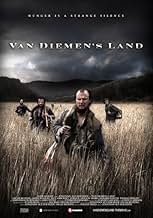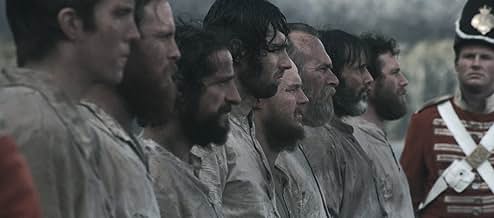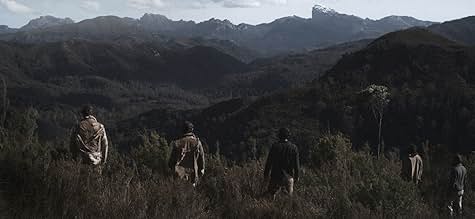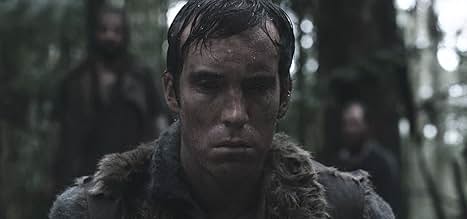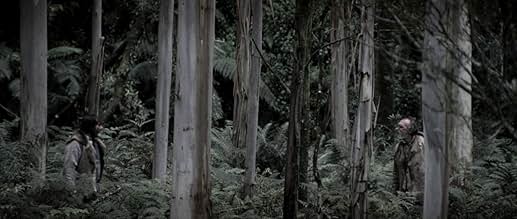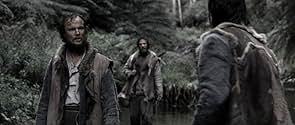VALUTAZIONE IMDb
5,9/10
3513
LA TUA VALUTAZIONE
Aggiungi una trama nella tua linguaAlexander Pearce, Australia's notorious convict, escaped Macquarie Harbour in 1822, finding the harsh Australian wilderness and abandoning hope in the harsh Australian wilderness.Alexander Pearce, Australia's notorious convict, escaped Macquarie Harbour in 1822, finding the harsh Australian wilderness and abandoning hope in the harsh Australian wilderness.Alexander Pearce, Australia's notorious convict, escaped Macquarie Harbour in 1822, finding the harsh Australian wilderness and abandoning hope in the harsh Australian wilderness.
- Regia
- Sceneggiatura
- Star
- Premi
- 2 vittorie e 1 candidatura in totale
Thomas M. Wright
- Thomas Bodenham
- (as Thomas Wright)
Zane Pinner
- Convict
- (non citato nei titoli originali)
Recensioni in evidenza
Despite moving at a slow pace and sometimes lacking in exposition, Van Diemen's Land is an impressive film. The story of Alexander Pearce's escape, along with 7 other convicts is gut-wrenching, especially when we take into account it is inspired by a true story (to which extent, we may never know).
As soon as the movie begins, you are hit by jaw-dropping cinematography that definitely takes you in this very different place and time. Silences and sounds are used to good effect and the minimalist score is wonderful yet bleak. The movie does not rely on much dialogue and at times, suffers a little from this
The characters are very life-like, even if they aren't sketched very clearly to start. You learn who these men are and what each is capable of over the course of the movie, which becomes increasingly bleak and permeated with a strange sense of evil. Not a cartoonish Hollywood-like evil but rather, the terrible things men can do and the group dynamics displayed when acts of cruelty are done.
The narration by the character Pearce did not work all that well for me, and the movie felt a tad long to me due to its slow pace but this was an uneasy viewing. The genre listed on IMDb is "thriller" but this felt much more like a very, very gruesome drama. This is a film bordering on horror themes. Do not expect flashy scenes of action and clear cut good guys against bad guys.
Worthwhile, even if somewhat depressing
As soon as the movie begins, you are hit by jaw-dropping cinematography that definitely takes you in this very different place and time. Silences and sounds are used to good effect and the minimalist score is wonderful yet bleak. The movie does not rely on much dialogue and at times, suffers a little from this
The characters are very life-like, even if they aren't sketched very clearly to start. You learn who these men are and what each is capable of over the course of the movie, which becomes increasingly bleak and permeated with a strange sense of evil. Not a cartoonish Hollywood-like evil but rather, the terrible things men can do and the group dynamics displayed when acts of cruelty are done.
The narration by the character Pearce did not work all that well for me, and the movie felt a tad long to me due to its slow pace but this was an uneasy viewing. The genre listed on IMDb is "thriller" but this felt much more like a very, very gruesome drama. This is a film bordering on horror themes. Do not expect flashy scenes of action and clear cut good guys against bad guys.
Worthwhile, even if somewhat depressing
The actual events of what happened after Alexander Pearce's first escape from the prison colony in Tasmania, according to Pearce himself, are shown in this movie.
It's probably somewhat too slow-moving for some young viewers, but I was impressed by how realistic it is. The characters are believable. The direction is meticulous. The acting is excellent, in many situations an actor's expression reveals feelings of uncertainty, confusion, guilt, fear, horror or misery. The cinematography showing the Tasmanian wilderness is visually splendid.
Do not expect a typical slasher/horror film, this movie is much more intelligently written and directed. The film's intention is to tell a story, rather than to frighten.
It's probably somewhat too slow-moving for some young viewers, but I was impressed by how realistic it is. The characters are believable. The direction is meticulous. The acting is excellent, in many situations an actor's expression reveals feelings of uncertainty, confusion, guilt, fear, horror or misery. The cinematography showing the Tasmanian wilderness is visually splendid.
Do not expect a typical slasher/horror film, this movie is much more intelligently written and directed. The film's intention is to tell a story, rather than to frighten.
A peculiar ghostly experience aside from the frequent and grotesque close ups of people masticating. The film starts with a supercilious officer slurping down some slimy bits of what looks like sea food (mollusks?) and moves onto the timber cutting scenes where the guard tries to cheer up the convicts - 'freedom is work lads, finish this and we go back'. Well, they might have listened to him. Instead, for the next two hours, we are stuck in the forests of Tasmania with the convicts after their 'escape', their numbers quickly diminishing as they take to slurping down tasty bits of each other. Again, as with too many films where there are a lot of male characters together - another is Carpenter's 'The Thing' - it is often difficult distinguishing one guy from the other, especially as most have beards here.. Yes, I kept flinching at the horrendous violence, but can't say I cared much for any of the victims - aside from the first, who seemed the most interesting and charismatic. In that respect, despite great images of trees in the wind and evocative music, it was a bit of a slog, just waiting for the next one to die, and knowing the historical outcome anyway. (It didn't help that my version lacked subtitles and the melancholic narration was in Irish!). But the most memorable thing here is the overall mood of despair and doom in a washed out landscape - largely filmed in gray to add to the sense of coldness and desolation (in fact it's probably beautiful and sunny most of the year!). Was it also intentional to not include one single animal in the entire film:? Perhaps the sight of another living creature would have lightened the mood so it was avoided (aside from the mention of one snake being seen). In fact, we never leave the company of these demented convicts who were better off staying prisoners and serving their sentences. Even when a small group of three break away and leave the main group of nutters, we never see these three again - no respite from our time among the cannibals. Meanwhile the constant beauty of the nature around them made me think: yes, lucky country if the company were a bit cheerier.
It definitely worth watching! It is a film that reveals the evil side of the humanity, but because it is not an action film or a romantic film, so i give it 8/10. Also, the reflection on humanity disgusted me and which define the film as a thriller. It is a good opportunity to know the history by watching this film, and to think about what action we would take if we were in that position, deeply review ourselves.
Having seen a documentary about this story a few years ago, I was enraptured by the story and absorbed until its conclusion. When I heard a film was in production, I was interested to see how it would be translated into a motion picture.
This should by no means considered a film that delivers on the potential of this story.
I suspect budgetary restraints ruled out the possibility of opening scenes such as the prisoner's arrival at Hell's Gates as the prisoners rowed for their lives through the stormy sea. Scenes in the courtroom where Pearce is confronted with the horror of his deeds were similarly ruled out. I also believe budgetary restraints were at the root of so much of the landscape views of Tasmania we were 'treated' to- a previous comment said the film works as an ad for the area, I didn't rent the film to see an ad for the landscape of Tasmania!
In one scene the director focuses on a mountain top for longer than five seconds (It was long enough for the thought to enter my mind- did he hike up here with a camera and say, well I made it up here so this shot is taking up at least six seconds of this movie!)
Budgetary constraints doesn't mean the film couldn't have been successful, engrossing, and in some ways this gave it an advantage over any big-budget films that may succeed it. Whereas they would spend time on back-story, by cutting straight to the shock value of the cannibalistic 'middle part of a possible trilogy' as suggested by an earlier comment, Auf Der Heide could have given a definitive interpretation of it. Time saved on earlier scenes could have been used to give more depth to the inter-group dynamics, leaving the viewer wondering 'who would be voted off next', in a Survivor-like scenario.
If you're making a film like this with a low budget, the focus has to be more on the human aspects of the group. For this to work, a strong narrative voice explaining the group dynamics was needed. Pearce would have been ideal for this, but instead we were presented with 'the quiet man', which proved disastrous.
Where could the film have succeeded in the context of it having a relatively low budget? How could it have better elicited tension and emotions?
· Fleeing the prison- dialogue about having to escape the deadly conditions would have helped us see the need for escape
· The decision to resort to cannibalism- the portrayal of how the resources diminish isn't done in a way that builds tension, it's merely documented. Members of the party were unaware whilst the others plotted, and the first murder took place at night while the first victim slept. This scene should have been shot through the ignorant ones' eyes as they wonder what's become of the group.
· This could have been followed by dialogue between the two who ran away about how they thought they were next and the plan of their subsequent escape from the group.
· Explaining the sub-groups; the miracle of Pearce's survival is that he was the outsider from the point where there was at least 4 left and in theory he should have been next in the pot. A narrative from him detailing these fears could have done wonders.
· When it came down to the two men, the pact that took place between the two men to renounce cannibalism has no place in the film. This could have been developed the theme, added to the tension as we question the two men's sincerity or even broken the pervasive silence.
· There was no moment of catharsis where he reaches the village and is 'saved', if a man can be saved after what he has been through.
Ultimately it's a poor script that failed to bring out the potential of the subject matter or to deliver any character I would either remember (the Alexander Pearce of my memory is the one whose character was explored in the documentary I saw) or whose survival I actually cared about even in the closing scenes of such dramatic potential.
This should by no means considered a film that delivers on the potential of this story.
I suspect budgetary restraints ruled out the possibility of opening scenes such as the prisoner's arrival at Hell's Gates as the prisoners rowed for their lives through the stormy sea. Scenes in the courtroom where Pearce is confronted with the horror of his deeds were similarly ruled out. I also believe budgetary restraints were at the root of so much of the landscape views of Tasmania we were 'treated' to- a previous comment said the film works as an ad for the area, I didn't rent the film to see an ad for the landscape of Tasmania!
In one scene the director focuses on a mountain top for longer than five seconds (It was long enough for the thought to enter my mind- did he hike up here with a camera and say, well I made it up here so this shot is taking up at least six seconds of this movie!)
Budgetary constraints doesn't mean the film couldn't have been successful, engrossing, and in some ways this gave it an advantage over any big-budget films that may succeed it. Whereas they would spend time on back-story, by cutting straight to the shock value of the cannibalistic 'middle part of a possible trilogy' as suggested by an earlier comment, Auf Der Heide could have given a definitive interpretation of it. Time saved on earlier scenes could have been used to give more depth to the inter-group dynamics, leaving the viewer wondering 'who would be voted off next', in a Survivor-like scenario.
If you're making a film like this with a low budget, the focus has to be more on the human aspects of the group. For this to work, a strong narrative voice explaining the group dynamics was needed. Pearce would have been ideal for this, but instead we were presented with 'the quiet man', which proved disastrous.
Where could the film have succeeded in the context of it having a relatively low budget? How could it have better elicited tension and emotions?
· Fleeing the prison- dialogue about having to escape the deadly conditions would have helped us see the need for escape
· The decision to resort to cannibalism- the portrayal of how the resources diminish isn't done in a way that builds tension, it's merely documented. Members of the party were unaware whilst the others plotted, and the first murder took place at night while the first victim slept. This scene should have been shot through the ignorant ones' eyes as they wonder what's become of the group.
· This could have been followed by dialogue between the two who ran away about how they thought they were next and the plan of their subsequent escape from the group.
· Explaining the sub-groups; the miracle of Pearce's survival is that he was the outsider from the point where there was at least 4 left and in theory he should have been next in the pot. A narrative from him detailing these fears could have done wonders.
· When it came down to the two men, the pact that took place between the two men to renounce cannibalism has no place in the film. This could have been developed the theme, added to the tension as we question the two men's sincerity or even broken the pervasive silence.
· There was no moment of catharsis where he reaches the village and is 'saved', if a man can be saved after what he has been through.
Ultimately it's a poor script that failed to bring out the potential of the subject matter or to deliver any character I would either remember (the Alexander Pearce of my memory is the one whose character was explored in the documentary I saw) or whose survival I actually cared about even in the closing scenes of such dramatic potential.
Lo sapevi?
- QuizOne of three Australian feature films made during the late 2000s about Irish convict Alexander Pearce. The three movies are: 'Dying Breed' (2008), 'Van Diemen's Land' (2009) and 'The Last Confession of Alexander Pearce' (2008) (TV).
- Citazioni
Alexander Pearce: A man with no blood on his hands is no man.
- ConnessioniFeatured in A Journey Up River: Making Van Diemen's Land (2009)
I più visti
Accedi per valutare e creare un elenco di titoli salvati per ottenere consigli personalizzati
- How long is Van Diemen's Land?Powered by Alexa
Dettagli
- Data di uscita
- Paese di origine
- Lingue
- Celebre anche come
- Savage Island
- Luoghi delle riprese
- Aziende produttrici
- Vedi altri crediti dell’azienda su IMDbPro
Botteghino
- Lordo in tutto il mondo
- 34.648 USD
- Tempo di esecuzione1 ora 44 minuti
- Colore
- Mix di suoni
- Proporzioni
- 2.35 : 1
Contribuisci a questa pagina
Suggerisci una modifica o aggiungi i contenuti mancanti

Divario superiore
By what name was Van Diemen's Land (2009) officially released in Canada in English?
Rispondi
